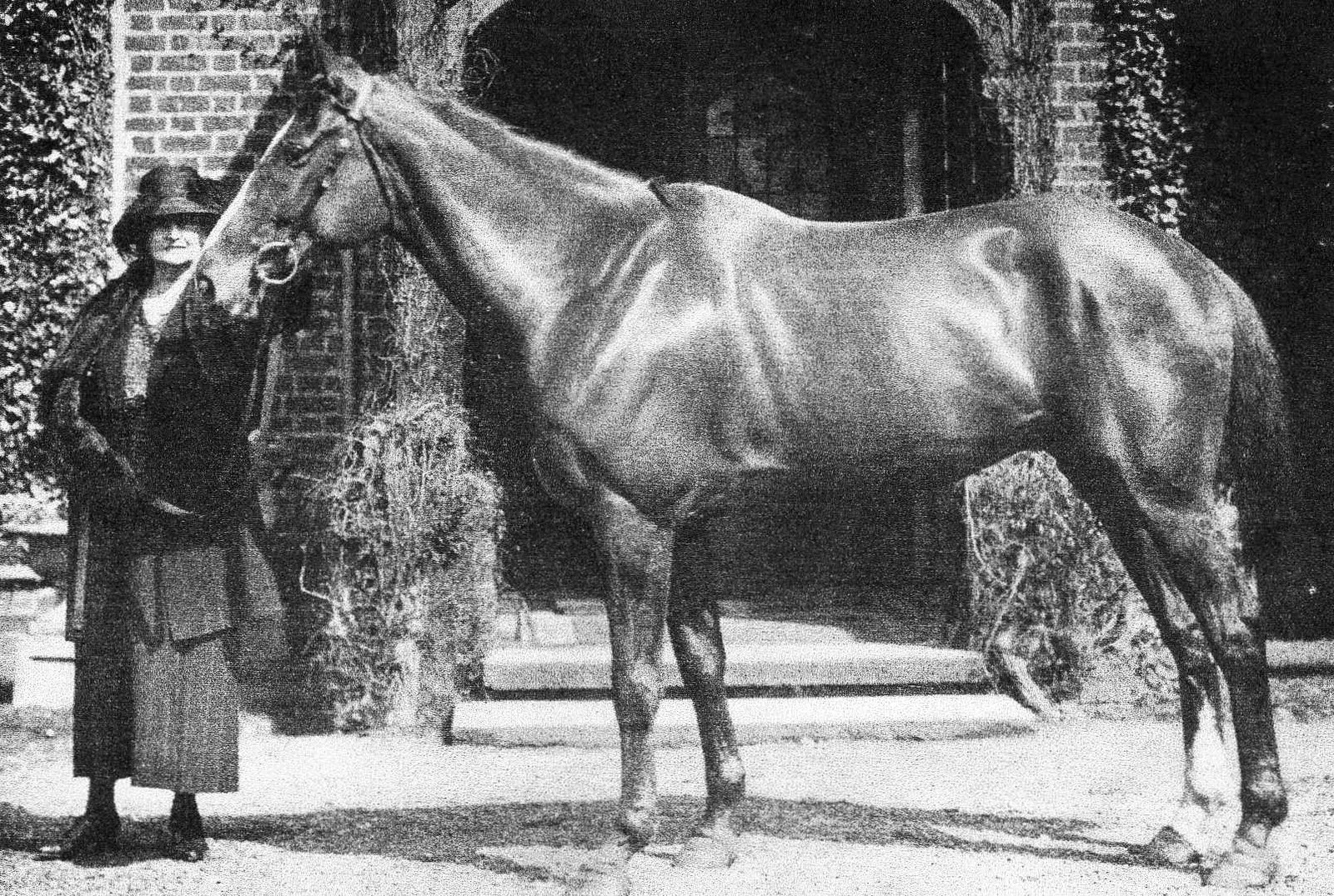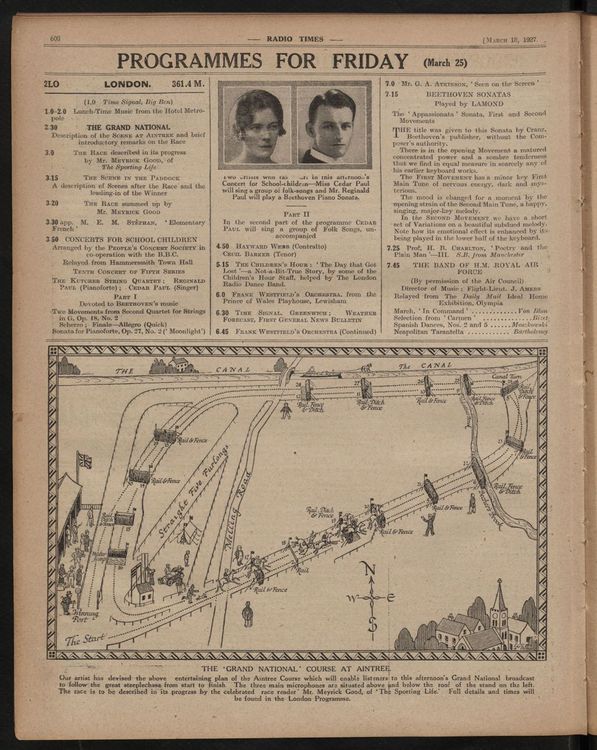1927 Grand National (lost radio coverage of horse racing event; 1927)
The 1927 Grand National was a horse racing event which occurred on 25th March 1927. The 86th overall, the event was won by Sprig with Ted Leader as his jockey, a length ahead of Bovril III. The race was the first Grand National to receive live radio coverage.
Background
The Grand National has been held since 1839, the handicap steeplechase race being the most prestigious horse racing event in the United Kingdom.[1][2] Heading into the 1927 edition, Sprig was declared the 8/1 favourite.[3][4][2] He was one of the last horses bred by Richard Crawshaw Bailey Partridge, a lieutenant in the Shropshire Yeomanry who died in France during the First World War.[4][2] Now owned by his mother Mary, she had Sprig be trained by Tom Leader, with his son Ted being set to ride the horse.[5][4][2][3] Ted Leader had previously been declared the Champion National Hunt Jockey in 1925-26, and had previously won the Cheltenham Gold Cup in 1925 with Ballinode.[5] There was concern Sprig would never achieve the crown, having finished fourth in the previous two Grand Nationals.[4][2] Nevertheless, Partridge and the Leaders were hoping to finally win the race at the third attempt, with Mary seeking to achieve her son's dream in part.[4][5][2] However, they would face intense competition from 36 rivals, producing the largest field for the event at the time.[3][4]
Earlier in 1927, the BBC had begun providing live radio coverage of major sports.[6][7][8][9] Starting with the England-Wales Five Nations rugby match on 15th January, the BBC would broadcast various sports in a short time span, including football and cricket.[6][8][7] But even before the BBC's swift new sports coverage, horse racing had previously received radio coverage, Marconi achieving this with the 1921 Epsom Derby.[7][6] However, further attempts to broadcast horse racing or indeed any other sports were thwarted by the print media, who were concerned that radio broadcasting sporting results such as the final football scores would undermine their sales.[10][7][6] Lobbying prevented several attempts from BBC managing director John Reith to broadcast various major sports in 1925, including the Epsom Derby.[7][6][10] This all changed early in 1927, when the BBC transformed into a Royal Charter, giving it the ability to finally cover live sports.[7][6][8][9]
Thus, the 1927 Grand National became its first public broadcast of a horse racing event, although it is noted that the organisation had conducted experiments a year prior.[9][8][7] A few days before the race, the BBC broadcast a special talk from Director of Programmes Roger Eckersley, who explained the challenges that would be faced covering both the event and the 1927 Boat Race, and how the corporation planned to overcome them.[11] In Issue 181 of Radio Times, a map of the course at Aintree was included to help listeners follow the event.[12][13] A few months later, the BBC would also provide commentary for the 1927 Epsom Derby.[14] The radio coverage of horse racing in turn further ensured both the Derby and Grand National became mainstream in British society.[9]
The Race
The night before the event, heavy rain affected the course.[4][2] It was still continuing to pour down during the morning, with a mist also limiting visibility.[2] Nevertheless, despite another massive shower commencing not long before race start, conditions were just about acceptable as the horses were marshalled at the post.[2][4] After a slow parade, the race finally began with most horses starting decently.[2][4][3] At the first fence, Thrown In fell while Silver Somme was uneased and quickly dropped out of contention.[3][2] At Bencher's Brook, six horses, including Somme, were eliminated, beginning a mass exodus of competitors throughout the race.[3][2] Two fences later, at the Canal Turn, frontrunners Grakle and Blaenor were among four to exit the race, while a further three disappeared from contention at Valentine's Brook.[3] By this point, Sprig was challenging 100/1 outsider and one-eyed Bovril III, Brights Boy, and Master Billie for the lead.[3][4][2]
Master Billie unseated their rider at the 27th fence, while remaining trio competed against each other and Drinmond.[3][2][4] Losing ground at the second Bencher's Brook jump, Sprig swiftly recovered from fifth to 1st after cutting a corner into Canal Turn.[3] After swapping places with the frontrunners at every remaining jump, Sprig was second heading into the final jump.[3][2] At the straight, Sprig narrowly took the lead from Bovril III and was ahead for the flat run to the finish.[3][2][4] While Bovril III and Brights Boy did provide competition, they were unable to rein in Sprig, enabling the latter to take victory ahead of Bovril III by a length.[3][2][4]
Sprig won his first Grand National at 10 years old, while Leader following in his brother Jack's footsteps by obtaining the victory.[2][3] His father was concerned he would never win the Grand National after Sprig's previous failures, but noted "But third time more than paid for all."[4] Further, Partridge became the third female owner to claim the win at the event.[2][3][4] In interviews following the event, an emotional Partridge expressed that while she was not a racing enthusiast, winning the Grand National had become the "ambition of my life", intensified further to win it for Richard.[4][2] She stated "I always thought the old horse would do it some day, and I am glad I kept him."[2] Of the 37 runners, just seven finished the entire course.[3][2][4] Sprig later competed in two further Grand Nationals, but falls prevented him from finishing either.[4]
Availability
Ultimately, the live radio coverage occurred during an era where the BBC lacked viable means of recording audio.[15][16] While recordings became more common in the 1930s with devices like the Blattnerphone, the BBC's oldest surviving sports radio clip is of the 1928 FA Cup Final.[17][15][16] Thus, the 1927 Grand National coverage is most likely permanently lost. The aforementioned Roger Eckersley talk is also missing for the same reasons. Nevertheless, various newsreel footage of the race is publicly viewable.
Gallery
Videos
Image
See Also
- 1921 Epsom Derby (lost radio coverage of horse racing event; 1921)
- 1931 Epsom Derby (lost televised footage of horse racing event; 1931)
References
- ↑ Past the Wire detailing the Grand National and its prestigious nature. Retrieved 5th Feb '23
- ↑ 2.00 2.01 2.02 2.03 2.04 2.05 2.06 2.07 2.08 2.09 2.10 2.11 2.12 2.13 2.14 2.15 2.16 2.17 2.18 2.19 2.20 2.21 The New York Times reporting on Sprig winning the race. Retrieved 5th Feb '23
- ↑ 3.00 3.01 3.02 3.03 3.04 3.05 3.06 3.07 3.08 3.09 3.10 3.11 3.12 3.13 3.14 3.15 Grand National Ultimate History detailing the results and betting odds of each horse. Retrieved 5th Feb '23
- ↑ 4.00 4.01 4.02 4.03 4.04 4.05 4.06 4.07 4.08 4.09 4.10 4.11 4.12 4.13 4.14 4.15 4.16 4.17 Hereford Times detailing the story behind Sprig's victory, including his training and the ambition to fulfil Richard Partridge's dream. Retrieved 5th Feb '23
- ↑ 5.0 5.1 5.2 Jockeypedia page on Ted Leader. Retrieved 5th Feb '23
- ↑ 6.0 6.1 6.2 6.3 6.4 6.5 Encyclopedia of Radio detailing the early UK broadcasts of sporting events like the 1921 Epsom Derby, and the lobbying made to stop such broadcasts prior to 1927. Retrieved 5th Feb '23
- ↑ 7.0 7.1 7.2 7.3 7.4 7.5 7.6 International Radio Journalism detailing the early attempts to broadcasts sports like the 1921 Epsom Derby, the lobbying that prevented sporting broadcasts in 1927, and the BBC becoming a Royal Charter that allowed for sports coverage from 1927 onwards. Retrieved 5th Feb '23
- ↑ 8.0 8.1 8.2 8.3 A Concise History of British Radio summarising key moments in BBC radio sports history, including its first racing commentary. Retrieved 5th Feb '23
- ↑ 9.0 9.1 9.2 9.3 BBC Sport in Black and White detailing BBC's early broadcasts of horse racing, including experiments in 1926. Retrieved 5th Feb '23
- ↑ 10.0 10.1 Inclusive Masculinities in Contemporary Football noting the print media's objections to radio covering sports, results in particular. Retrieved 5th Feb '23
- ↑ BBC Genome archive of Radio Times detailing the broadcast made by Roger Eckersley regarding covering the Grand National and the Boat Race. Retrieved 5th Feb '23
- ↑ Issue 181 of Radio Times listing the broadcast and providing a map of the course. Retrieved 5th Feb '23
- ↑ BBC Genome archive of Radio Times issues detailing the broadcast of the race. Retrieved 5th Feb '23
- ↑ Racing Questions noting BBC radio covered both the 1927 Grand National and Epsom Derby. Retrieved 5th Feb '23
- ↑ 15.0 15.1 BBC noting it had no viable means of recording sound until the introduction of the Blatterphone in 1930. Retrieved 5th Feb '23
- ↑ 16.0 16.1 BBC noting it did not start recording radio coverage until the early-1930s. Retrieved 5th Feb '23
- ↑ BBC providing an extract of surviving radio coverage from the 1928 FA Cup Final, the oldest sporting clip in its archives. Retrieved 5th Feb '23

